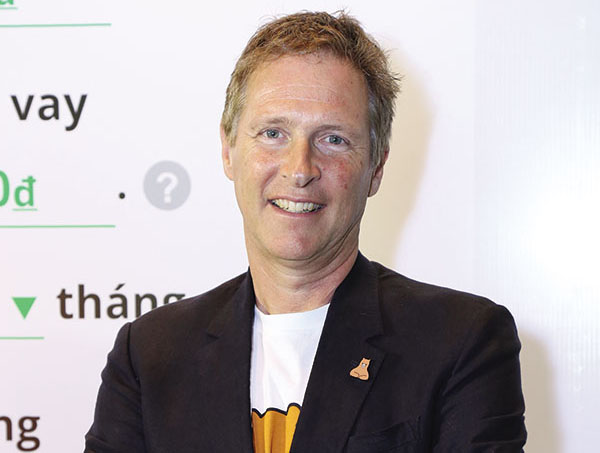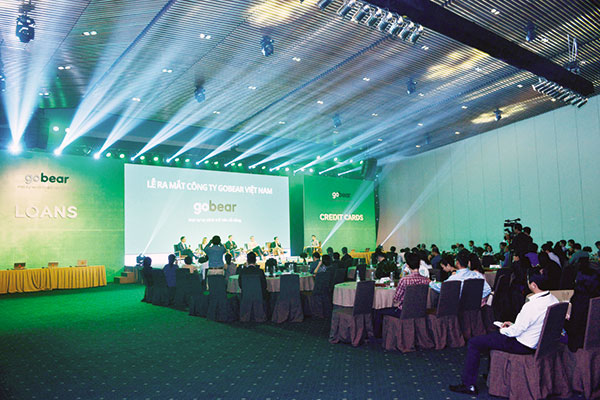GoBear looks to become the “TripAdvisor of finance”
 |
In the financial technology (Fintech) sector, what are some aspects and trends that are unique to the Vietnamese market?
It’s evident that Vietnam remains underbanked, as only 30 per cent of the adult population has a bank account. This figure is much lower than in nearby countries like Singapore or Malaysia, but it also means the Vietnamese financial sector has great potential to grow. At the same time, internet usage in Vietnam is growing very fast with one-half of the population now online. Customers between 25 and 45 years old are particularly tech-savvy.
Another trend is that Vietnamese consumers are increasingly irritated by traditional marketing channels such as cold calls, thus financial institutions are trying to find alternative options to talk directly with their potential customers. These facts present a golden opportunity for Fintech companies, and indeed we’ve seen a rise in Fintech startups over the past two years in Vietnam.
However, challenges include overcoming the scepticism that Vietnamese consumers still have about non-cash payments and other new financial services. Similarly, it can be difficult for Fintech startups to convince credit institutions, as the latter may already have an established way of operation and it may take time for their conservative lenders to collaborate with Fintech startups.
The initial distrust of Fintech startups in Vietnamese consumers’ minds may also stem from the overall lack of transparency in the financial sector, especially when it comes to interest rates and fees. To select the most suitable service, the Vietnamese often rely on anecdotal sharing from friends and family or do the comparisons by themselves. This process is time-consuming and prone to errors.
 |
| GoBear has relied on its transparency and successful runs in other markets to convince credit institutions of its credibility |
How can Fintech startups in Vietnam respond to these trends?
The challenges I just mentioned can actually be good opportunities for Fintech startups, as they can provide solutions to those problems. For instance, GoBear was formed on the need for an online tool to help users search for complex financial products in a transparent and unbiased way. The unique and powerful proposition of GoBear is that we provide a transparent overview of the market. With our personalised search and filtering functions, consumers can have a side-by-side comparison based on their needs. This way of searching for financial products is new to Asia.
Founded in 2015 in Singapore, GoBear has recorded 4.5 million users through Singapore, Thailand, Malaysia, Philippines, and Hong Kong.
We just arrived in Vietnam this month, and introduced information about different credit cards and personal loans available in the market for users to easily compare and choose the ones that best fit their financial needs - all free of charge. In short, we aim to be the TripAdvisor of financial services.
Vietnamese consumers can now visit the GoBear website to compare nearly 200 credit cards and 30 name lending facilities, from 50 existing banks and finance companies in the market. To ensure impartiality, GoBear is not influenced by service providers’ advertising and users do not buy anything from our website.
You mentioned earlier that Vietnamese consumers and credit institutions still remain sceptical of Fintech startups. How did GoBear gain their trust?
Our greatest asset is impartiality and transparency, which all Vietnamese consumers look for when comparing different financial services. GoBear works for consumers’ best interests, which means we have to be fair and independent at all times. We believe that this high level of ethics will draw users to our service.
It’s actually been challenging to persuade credit institutions to work with us. In the Philippines, for example, we had to spend five months presenting our work to various executives of a leading bank before they finally agreed to partner up. To make it easier for lenders, we offer a “trial period” in which they can put their services on our website, see if they like it, and decide whether they would like to continue. So far, no credit institution has taken their service offerings off our website, and we believe that this speaks volumes about our credibility.
For Vietnam, it’s a bit easier for us since we’ve already collaborated with global financial institutions like Citi, HSBC, or Standard Chartered, and these partnerships extend to the Vietnamese market. Domestic banks also feel more convinced to join GoBear after they see that international banks have already worked with us.
As a free service provider, how can GoBear generate profits for your investors? Moreover, financial products like insurance or personal loans often have a complex method to tailor interest rates to each customer. How can GoBear help users with this while ensuring their privacy?
First, we should repeat that GoBear does not accept advertising from suppliers that will influence the core search results, which means our search results are all customised to users’ needs and free from promotions. Likewise, we will not charge users as our promise is that all information is available for free. Users don’t buy anything from us, but they can buy from the supplier of choice. We simply show them all the great deals, they compare, and then they choose what’s right for them. Once they’ve made that choice, we connect them to the insurance provider or the bank to finalise the deal. Those providers pay us a small referral fee, and that’s how we bring home the bacon. This method is similar to Google, TripAdvisor, and many other seach engines.
It’s true that there are many variables to consider when it comes to setting interest rates for insurance packages and personal loans. At the same time, users should not be concerned with sharing information about their finances on our website because we do not collect personal details. GoBear results work with the broadest assumption about the user, and we will refer users to any service provider that they choose for in-depth consultation.
What the stars mean:
★ Poor ★ ★ Promising ★★★ Good ★★★★ Very good ★★★★★ Exceptional
Latest News
More News
- Vietnam and EIB strengthen financial cooperation (March 13, 2025 | 18:38)
- MoF Deputy Minister receives Special Advisor of Japan-Vietnam Parliamentary Friendship Alliance (March 13, 2025 | 16:34)
- Vietnam and Singapore to build legal framework for capital markets and digital assets (March 13, 2025 | 11:09)
- Wood exporters wary about surging tariff pressures (March 13, 2025 | 10:16)
- Pacifico Energy eyes major wind energy investments in Vietnam (March 13, 2025 | 10:14)
- Ho Chi Minh City looks to develop potential of Saigon River (March 12, 2025 | 13:34)
- Vietnam and Singapore to enhance economic connectivity (March 12, 2025 | 11:43)
- National Assembly Standing Committee approves 30 per cent land rent cut (March 11, 2025 | 16:25)
- Vietnamese corporations cooperating with Indonesian companies (March 11, 2025 | 11:44)
- VinFast supercharges EV growth in Indonesia (March 10, 2025 | 17:31)
















 Mobile Version
Mobile Version